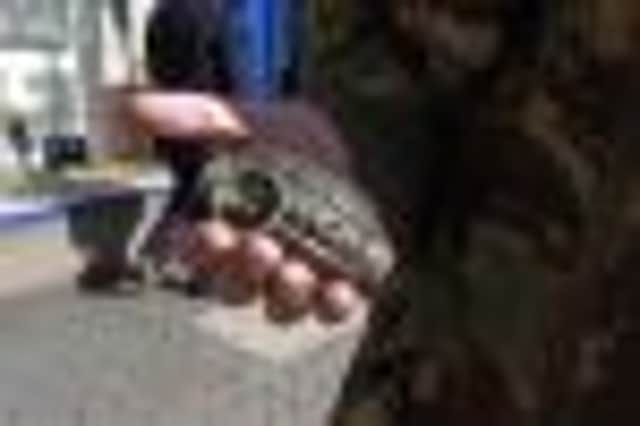Calls to homemade explosive incidents on the rise


Ministry of Defence bomb disposal teams were called out to four times as many incidents in 2011 as 2010.
While the figures are only a snapshot and police leaders said they were not aware of a growing trend, they are concerned by the increase.
Advertisement
Hide AdAdvertisement
Hide AdThere have been some high-profile cases involving homemade bombs – or improvised explosive devices (IEDs), as they are officially known – which can kill or cause serious injury.
In 2010, bomb disposal experts were called to deal with 13 IEDs. That rose to 40 in 2011.
Chief Superintendent David O’Connor, president of the Association of Scottish Police Superintendents, said: “This increase is a matter of public concern. We would need to sit down and look at the statistics and see if there is any link between the different cases.
“The new police service needs to look at this to see what we need to do in terms of education but, more importantly, what we need to do in terms of enforcement of the law, as this development is, glaringly obviously, a matter of public risk.”
Whilst the numbers were relatively low, he said the implications were “significant”, adding: “There can be loss of life, serious injury and loss of liberty.”
Police stressed there had been a number of significant incidents involving home-made explosives. One such case involved Trevor Muirhead, 44, from Kilwinning, and Neil McKenzie, 43, from Saltcoats, both Ayrshire, who were convicted last year of sending parcel bombs in 2011 to Celtic manager Neil Lennon, former MSP Trish Godman and the late QC Paul McBride.
Both were sentenced to five years in prison and lost an appeal against conviction last week.
In December, Connor Ward, 20, who has long-standing mental health problems, was sentenced to three years’ detention after planning to blow up his paedophile father. He had “key ingredients” for a home-made bomb in his flat in Banff, and police set up a 100-metre exclusion zone while bomb disposal experts carried out a search.
Advertisement
Hide AdAdvertisement
Hide AdIncidents to which the MoD was called in 2011 included a Glasgow bomb disposal squad called out to a kebab shop, where they found three two-litre plastic bottles connected with copper wire and filled with flammable liquid.
A letter with a “bulge” and sectarian abuse printed on it was posted to a florist in Renfrew-shire, while a suspect A4 jiffy bag was found at Cowdenbeath Football Club.
In another incident, a member of the public walked into a Dundee police station with what they thought was a firework, only to find out it was an unexploded device.
However, the number of IEDs remains minor compared with the 451 conventional munitions discovered since the start of 2010, which included unexploded bombs from the world wars, and lost devices used in training exercises.
Bazooka rounds, unexploded mines and a glass phial thought to be filled with mustard gas were among the items MoD disposal officers have been called to deal with.
More unusual incidents included a call to deal with 140 grammes of explosives that turned out to be two dog training kits and a “tornado jet warhead” that was actually a mine.
An MoD spokesman said: “Each operation is inherently dangerous and it is testament to the bravery, skills and training of these specialised personnel.”